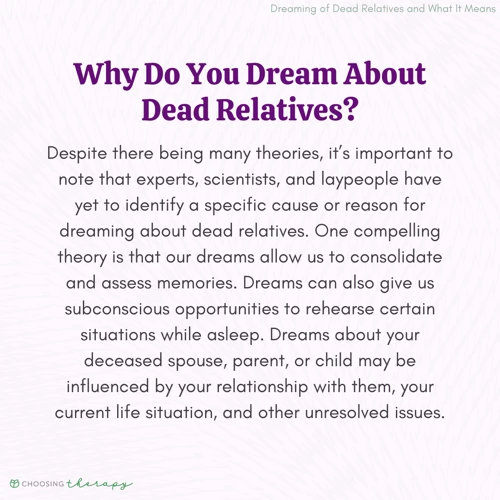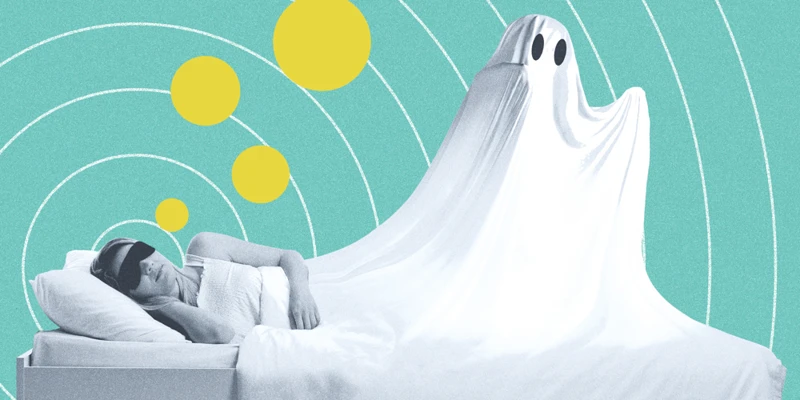Have you ever experienced the sensation of dreaming about someone who has passed away? These dreams can be incredibly powerful and leave us with lingering questions about their meaning and significance. In this article, we will delve into the mysterious realm of dreams about deceased loved ones and explore the possible reasons behind them. Whether it’s the subconscious mind at work, messages from the spiritual realm, or a search for closure and healing, understanding these dreams can offer comfort and insights into our journey of grief and healing. Join us as we unravel the secrets behind dreaming about departed souls and learn how to interpret and cope with these profound experiences.
Why Do We Dream about Deceased Loved Ones?

One possible reason for dreaming about deceased loved ones is the role our subconscious mind plays in processing grief and emotions. Dreams act as a gateway to our deepest emotions and can provide an avenue for healing and closure. When we dream about someone who has passed away, it may be a reflection of our unresolved emotions or the need to confront and work through our grief.
Another interpretation is that dreams about deceased loved ones can be a form of communication from the spiritual realm. Some believe that the departed souls can use dreams as a medium to convey messages or offer guidance and support. These dreams may provide comfort, reassurance, or even important insights that can help us navigate through life.
1. The Subconscious Mind and Emotional Healing
When we dream about a deceased loved one, it could be our subconscious mind’s way of helping us process and heal from the emotions associated with their passing. Dreams offer a safe space for our emotions to surface and be processed. They allow us to confront unresolved feelings, such as guilt, sadness, or even anger, that we may have suppressed during our waking hours.
Through these dreams, our subconscious may be urging us to face these emotions head-on and find a resolution. It could be an opportunity for catharsis, allowing us to release pent-up emotions and find a sense of closure. By exploring and acknowledging these feelings in our dreams, we can pave the way for emotional healing and growth.
2. Messages from the Spiritual Realm
When we dream about deceased loved ones, it is believed by some that these dreams serve as messages from the spiritual realm. These messages can come in various forms and may carry profound significance. They can offer guidance, reassurance, or even warnings. It’s important to pay attention to the details of the dream, as symbols and imagery can hold deep meaning. For example, seeing a deceased loved one in a dream may indicate that they are trying to communicate with us or offer their presence and support. The emotions we feel during these dreams can also provide insight into the message being conveyed. It’s essential to keep an open mind and trust our intuition when trying to interpret these dreams from the spiritual realm.
Interpreting Dreams about Departed Souls

When it comes to interpreting dreams about departed souls, there are a few key factors to consider. One possibility is that these dreams reflect an emotional connection and unresolved issues with the deceased person. It could indicate the need for closure or reconciliation in order to find inner peace.
Another perspective is that dreaming about a departed loved one can be a way of seeking guidance and support from the other side. This could manifest as receiving advice, comfort, or a sense of presence from the deceased person, helping us navigate through challenging situations.
Lastly, dreams about departed souls may also serve as a means of seeking closure and finding inner peace. It can be an opportunity for us to process and come to terms with our grief, allowing us to move forward with our lives.
1. Emotional Connection and Unresolved Issues
One possible interpretation of dreaming about a deceased loved one is the presence of an emotional connection and unresolved issues. These dreams often occur when there are lingering feelings or unexpressed emotions towards the departed person. Through dreams, our subconscious mind offers us a chance to confront these emotions and seek closure. It may also be an opportunity to reflect on past interactions and resolve any conflicts or unfinished conversations that were left unresolved.
By exploring the emotional connection and unresolved issues in our dreams, we can gain a deeper understanding of our feelings towards the deceased person and find ways to heal and move forward.
2. Guidance and Support from the Other Side
When we dream about a deceased loved one, it is believed by some that they may be reaching out to provide guidance and support from beyond the grave. These dreams often carry a sense of comfort and reassurance, as if our loved ones are reminding us that they are still watching over us and guiding us on our life’s journey.
These dreams can offer valuable insights and messages that can help us make decisions or find clarity in challenging situations. They may come in the form of vivid conversations, symbols, or even feelings of presence. Paying attention to the details and emotions experienced in these dreams can help us decipher the guidance and support being offered from the other side.
3. Seeking Closure and Inner Peace
Seeking closure and inner peace is another significant reason behind dreaming about deceased loved ones. These dreams often occur when there are unresolved issues or feelings of guilt, regret, or unfinished business associated with the person who has passed away. It’s as if our subconscious is urging us to confront these emotions and find a sense of closure.
Dreams of departed loved ones provide an opportunity for us to process these emotions and let go of any negativity or burden we may be carrying. They can serve as a catalyst for healing, allowing us to find peace within ourselves and with the memory of the person we have lost. Through these dreams, we can learn to accept their absence and the changes it has brought to our lives.
Ultimately, seeking closure and inner peace in relation to our departed loved ones is a deeply personal journey. It involves understanding and accepting our emotions, forgiving ourselves and others, and finding a sense of peace and resolution in our hearts. Dreams can be a guiding force in this process, providing us with the opportunity to explore and heal on a subconscious level.
Common Symbolism in Dreams about Deceased Persons

When dreaming about deceased persons, the dreams often contain significant symbolism that can provide deeper insights into their meaning. One common symbolism is communication through symbols and dreamscapes. For example, seeing a loved one in a dream may represent a desire for connection or a need for closure. Additionally, encountering specific objects or locations that hold personal significance to the departed person can carry spiritual messages or reminders.
Another common symbolism is the presence of signs and messages within the dream experience. These can manifest in various ways, such as hearing the deceased person’s voice, receiving a meaningful object, or experiencing vivid and emotionally charged scenarios. These signs serve as guidance or reassurance from the spiritual realm, conveying that the departed loved one is still connected and watching over us.
1. Communication through Symbols and Dreamscapes
When we dream about deceased individuals, the communication often occurs through symbols and dreamscapes. These symbols can hold deep personal meaning and may vary from person to person. For example, seeing a white dove may symbolize peace or a sense of spiritual connection, while a clock ticking could represent the passing of time and the inevitability of change.
Similarly, the dreamscapes in which these interactions take place can be significant. It could be a familiar place from our past shared with the departed loved one, or a surreal environment that represents the ethereal nature of the spiritual realm. It’s important to pay attention to these symbols and dream settings as they can provide clues and insights into the messages being conveyed.
2. Signs and Messages in the Dream Experience
Dreams about deceased persons often contain various signs and messages that can hold deep significance. These signs may come in the form of symbols, vivid imagery, or even direct communication. For example, you might experience seeing your loved one in a dream, hearing their voice, or receiving specific messages that hold personal meaning. The interpretation of these signs and messages can vary for each individual. It’s essential to pay attention to the emotions and sensations felt during the dream and to reflect on the possible meanings and guidance they may offer. These symbolic elements can serve as a form of communication between the spiritual realm and our waking consciousness, providing comfort, closure, or a sense of ongoing connection with our departed loved ones.
Techniques to Enhance Dream Recall and Exploration

Enhancing dream recall and exploration can help us gain a deeper understanding of our dreams about deceased loved ones. One technique is to keep a dream journal by our bedside and write down any details or emotions felt upon waking. This practice helps us develop a habit of remembering dreams and allows us to analyze patterns or symbols that may emerge over time.
Another method is through meditation and mindfulness. By practicing relaxation techniques before bed, such as deep breathing or guided meditation, we can create a calm mental space that is conducive to vivid dreaming. Additionally, setting the intention to remember and explore our dreams can increase our chances of experiencing more vivid and memorable dreams.
1. Keeping a Dream Journal
One effective technique to enhance dream recall and exploration is keeping a dream journal. By documenting your dreams immediately upon waking, you can capture the details, symbols, and emotions experienced during the dream state. This practice not only improves your ability to remember dreams but also allows you to analyze patterns, themes, and connections between dreams over time. Writing in a dream journal can help you uncover deeper meanings and interpret messages from deceased loved ones that may be present in your dreams.
2. Meditation and Mindfulness for Dream Clarity
Meditation and mindfulness practices can greatly enhance dream recall and clarity. By cultivating a calm and focused mind through meditation, we can increase our awareness of our dreams and improve our ability to remember them upon waking. This can be done by incorporating mindfulness techniques throughout the day, such as regularly checking in with our present moment experiences and being fully engaged in our surroundings. Additionally, setting the intention to remember our dreams before going to sleep can also be helpful. By creating a peaceful and attentive mental state, we can enhance our connection with the dream world and gain deeper insights from our dreams about deceased loved ones.
Coping with Dreams of Departed Loved Ones
Coping with dreams of departed loved ones can be a complex process that requires emotional support and self-care. It is important to acknowledge and validate your feelings surrounding these dreams. Journaling can be an effective tool for processing emotions and gaining insights into the meaning behind these dreams.
Seeking professional help from therapists or grief counselors can also provide valuable support in navigating the complexities of grief and dreams. They can offer guidance on how to cope with the emotions that arise from these dreams and provide strategies for healing.
Self-care practices such as mindfulness and meditation can help in finding inner peace and managing the emotions that come with dreaming about departed loved ones. These practices can help calm the mind, improve sleep quality, and promote overall well-being. Additionally, engaging in activities that bring you comfort and joy can act as a positive distraction and aid in the healing process.
1. Emotional Support and Self-Care
When coping with dreams of departed loved ones, it is important to prioritize emotional support and self-care. These dreams can stir up intense emotions and may leave us feeling unsettled or emotionally vulnerable. Here are some strategies to navigate through this experience:
- 1. Seek emotional support: Reach out to friends, family, or a support group who can provide a safe space to discuss and process your feelings. Sharing your dreams and emotions with others who have experienced similar situations can be particularly helpful.
- 2. Practice self-care: Engage in activities that bring you comfort and peace. This may include exercise, journaling, meditation, or spending time in nature. Taking care of your physical and mental well-being is crucial during periods of heightened emotions.
- 3. Validate your feelings: It’s natural to have a range of emotions when dreaming about departed loved ones. Allow yourself to feel whatever arises, whether it’s sadness, longing, or even joy. Avoid judging or criticizing your emotional responses.
- 4. Engage in relaxation techniques: Explore different techniques such as deep breathing exercises, aromatherapy, or listening to calming music before bed. These practices can help create a sense of calm and promote restful sleep.
Remember that everyone copes with these dreams differently, and it’s essential to find strategies that resonate with you personally. If needed, don’t hesitate to seek professional help from a therapist or counselor who specializes in grief and loss.
2. Seeking Professional Help if Needed
While dreams about deceased loved ones can be a natural part of the grieving process, there may be instances where these dreams become overwhelming or cause distress. If you find yourself constantly preoccupied with dreams of departed souls or if these dreams are interfering with your daily life and emotional well-being, it may be beneficial to seek professional help.
A therapist or counselor experienced in grief counseling can provide guidance and support as you navigate through the complexities of your dreams and emotions. They can help you explore the underlying meanings and significance of these dreams, offering tools and techniques to cope with the grief and find inner peace. Remember, there is no shame in reaching out for professional assistance when needed, as it can be a valuable resource in your healing journey.
Conclusion
Frequently Asked Questions
1. Can dreaming about a deceased loved one be a sign of their presence or communication?
Yes, many people believe that dreams about deceased loved ones can be a form of communication from the spiritual realm. It is believed that the departed souls can use dreams as a means to convey messages, offer guidance, or simply let their presence be known.
2. Are dreams about deceased loved ones always comforting?
No, dreams about deceased loved ones can vary in nature and emotion. While some can be comforting and provide a sense of closure or reassurance, others may stir up unresolved emotions or even evoke feelings of sadness or fear. It is important to remember that each dream is unique and may have different meanings for each individual.
3. Why do dreams about deceased loved ones occur more frequently during times of grief?
Dreams about deceased loved ones may occur more frequently during times of grief because our subconscious mind is actively processing and working through our emotions. These dreams can act as a healing mechanism and offer a space to confront and process our feelings of loss.
4. Can dreams about deceased loved ones provide guidance or insight into our lives?
Yes, dreams about deceased loved ones can provide guidance and insight into our lives. Some people believe that these dreams hold symbolic messages or signs from the spiritual realm, which can offer insights or guidance on a personal or spiritual level.
5. Are there common symbols or signs in dreams about deceased loved ones?
Yes, there can be common symbols or signs in dreams about deceased loved ones. These symbols can vary depending on the individual and their personal connection with the departed loved one. It is important to pay attention to the specific details and emotions within the dream to decipher the meaning behind these symbols.
6. How can I enhance my dream recall to better analyze my dreams about deceased loved ones?
Keeping a dream journal can help enhance your dream recall. By recording your dreams immediately after waking up, you can capture the details and emotions while they are still fresh in your memory. Additionally, practicing meditation and mindfulness can also improve dream clarity and help you remember your dreams more vividly.
7. Is it normal to feel a strong emotional connection to a deceased loved one in a dream?
Yes, it is normal to feel a strong emotional connection to a deceased loved one in a dream. Dreams have a way of tapping into our deepest emotions, and it is common to experience intense emotions, whether it be love, joy, sadness, or even anger, when dreaming about someone who has passed away.
8. Should I seek professional help if my dreams about a deceased loved one are causing distress?
If your dreams about a deceased loved one are causing distress or significantly impacting your emotional well-being, it may be beneficial to seek professional help. Grief counseling or therapy can provide additional support and guidance in processing your emotions and navigating through the grieving process.
9. Can dreams about deceased loved ones help in finding closure?
Yes, dreams about deceased loved ones can help in finding closure. These dreams can provide an opportunity to address unfinished business or unresolved issues, allowing for emotional healing and a sense of closure. They can also offer a chance to say goodbye or seek forgiveness.
10. Are dreams about deceased loved ones a sign that they are at peace?
While dreams about deceased loved ones can be comforting, they do not necessarily indicate whether the person is at peace or not. Dreams can be influenced by various factors, including our own emotions, memories, and subconscious mind. It is essential to approach these dreams with an open mind and consider the personal significance and symbolism behind them.







